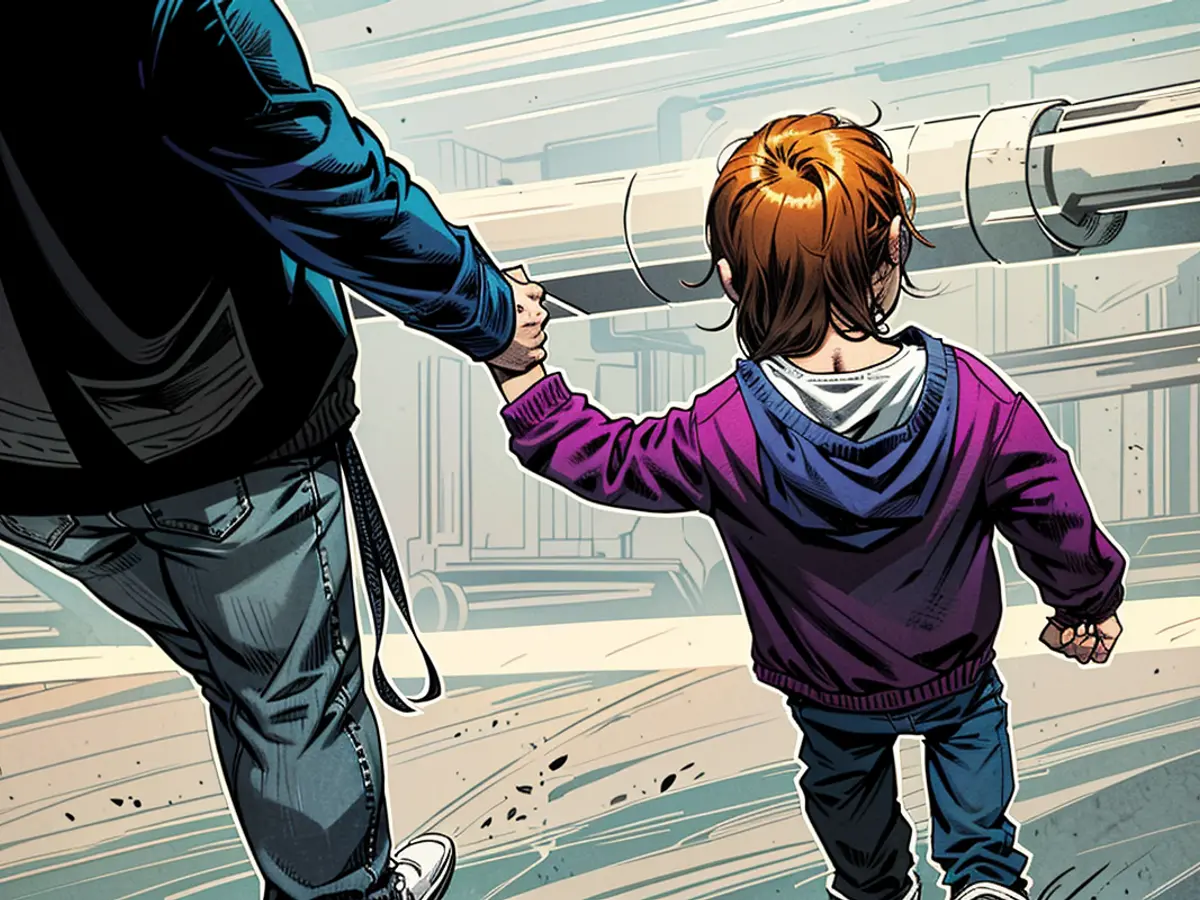Struggling single parents continue to find themselves trapped in poverty despite their best efforts.
In Germany, close to two million kids grow up in single-parent households, primarily with a single mother residing solo. A study reveals that around 41% of these households are struggling below the poverty line, with Child Benefits not making a significant impact, as reported by the Bertelsmann Foundation.
Single-parent households remain disproportionately afflicted by poverty, according to the study. Out of about 1.7 million single parents with minor children, 41% were below the poverty line last year, according to the Bertelsmann Foundation. In comparison, between 8% (for one child) and 30% (for three or more minor children) of two-parent families were at risk of poverty.
The proposed Child Benefit is deemed insufficient to effectively combat poverty, criticized the family expert of the Foundation, Anette Stein. "What's currently on the table won't address the issue." While some single parents may see improvements, others could even face worsening conditions. The legislative process has been delayed for months.
Predominantly single mothers
In single-parent households, about 82% comprise a single mother with her offspring, while in around 18% there's a single father. For years, these families' precarious state has gone unimproved despite occasional relaxations, lament the study authors. People in relative poverty, or at risk of poverty, are individuals who earn less than 60% of the average income of the overall population. In simple terms, this might mean no family vacation, daily sacrifices, no financial security reserves, and minimal cultural or social participation, which can be challenging, especially for children and teenagers.
Among the 8.5 million families in Germany with children under 18 years old, approximately 20% were single-parent families. The slight increase since 2019 to currently around 1.7 million single-parent families with minor offspring is partly due to refugees from Ukraine. Regional differences exist, with a single-parent rate of 16.5% in Bavaria and 27.5% in Berlin.
Almost half of all children growing up in a household receiving social assistance live in a household with only one parent. For single mothers, the risk of poverty is particularly high. The share of single-parent households with social assistance is highest in Bremen at 55% and lowest in Thuringia at 27%.
High employment quotas
According to the Foundation's evaluation, poverty among many single parents cannot be attributed to lack of employment. "71% of single mothers and 87% of single fathers are employed," it states in Gütersloh. The financial struggles faced by many single parents are often due to missed child support payments. Reforms of the Child Support Advance or the Child Allowance have not significantly improved the difficult situation for many single parents.
The Foundation calls for more kindergarten spots, reliable full-day care in schools, more flexible work time models, and additional incentives for fathers to take on more responsibilities for their children and care work.
The Traffic Coalition has long advocated for the Child Allowance, which aims to consolidate previous benefits for children, such as child allowance, payments from the Citizen's Allowance for Children, or the child supplement. The Bundeskabinett approved a draft in the fall of 2023, with Bundesfamilienministerin Lisa Paus (Greens) and Finance Minister Christian Lindner (FDP) agreeing on initially 2.4 billion Euros in additional costs. With growing demand, the amount could reach up to six billion Euros per year by 2028. Whether the Child Allowance will take effect at the start of 2025, as Paus intends, remains uncertain. Many questions are still unanswered, with the coalition factions SPD and FDP expressing significant objections in the Bundestag. Lindner also remains skeptical.
The current draft for the Child Allowance will "not come close to releasing all single-parent families from poverty," according to the study authors. The initiative is important as a first step and is likely to improve the situation for some single parents. However, the amount - that is, the existence allowance - needs to be reassessed, which the current draft does not achieve, the study criticizes. Current financial benefits are far from sufficient.
Regulatory requirements must be realistically determined, and in doing so, children and adolescents must be prioritized. Regular surveys showed a reflective, competent, and responsible approach to this topic by adolescents with poverty experiences, emphasizes expert Stein. To prevent feared worsening for some single parents, changes to alimony regulations are urgently needed in the draft.
Important from the foundation's perspective: For all eligible parties, there should be a reliable, low-threshold contact point for advice from a single source. These should be Family Service Stations, which, while not yet operational from 2025, should be enshrined in law and then established gradually.
Read also:
The Bertelsmann Foundation's study revealed that international data shows a similar trend, with around 41% of single-parent households also facing poverty. Despite the efforts of single parents to lift themselves out of poverty, the lack of sufficient child support often exacerbates their financial struggles.






